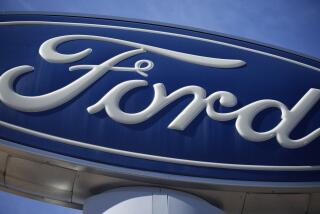Ford to Focus More on Biofuels, Less on Hybrids
DETROIT — In a sharp shift of strategy, Ford Motor Co. plans to focus less on hybrid technology and more on a wider range of alternatives to traditional gasoline-powered engines, Ford Chief Executive Bill Ford Jr. told the automaker’s employees.
The CEO backed away from a commitment made last fall to build production capacity for 250,000 hybrid vehicles by the end of the decade, calling that goal “too narrow” in a companywide e-mail message Wednesday. The No. 2 U.S. automaker released the e-mail to media Thursday.
Ford, which has faced criticism for lacking a consistent vision for its product development strategy, had heavily promoted its commitment to hybrid technology. Hybrids run on a combination of gasoline and electricity.
“Our strategy going forward is not to wed ourselves to a single technology,” Bill Ford said. “The strategy doesn’t focus on one catch-all solution but offers a flexible array of options, including hybrids, clean diesels, bio-diesels, advanced engine technologies and E85 ethanol.”
U.S. automakers have offered a pledge to more than double their annual production of vehicles capable of running on renewable fuels such as ethanol to 2 million cars and trucks by 2010.
The commitment to more vehicles powered by fuels other than gasoline follows a meeting among the CEOs of Ford, General Motors Corp., DaimlerChrysler’s Chrysler Group and congressional leaders last month on efforts to reduce U.S. dependence on foreign oil.
The executives and lawmakers also discussed ways to help the struggling Detroit-based carmakers better compete with Asian rivals such as Toyota Motor Corp. and Honda Motor Co.
Ford beat its U.S. rivals by producing the first American-made full hybrids, which offer sharply improved gas mileage through the use of a battery that recharges during braking.
Full hybrids are capable of running on electric power at low speeds, such as in stop-and-go traffic.
But Ford has to resort to sales incentives to sell its Escape Hybrid and Mercury Mariner Hybrid models, a sharp contrast to the success that Toyota has seen with its sold-out Prius hybrid.
The stakes are particularly high for Ford, which has the lowest fleet mileage of any of the automakers and relies on light trucks for two-thirds of its sales.






